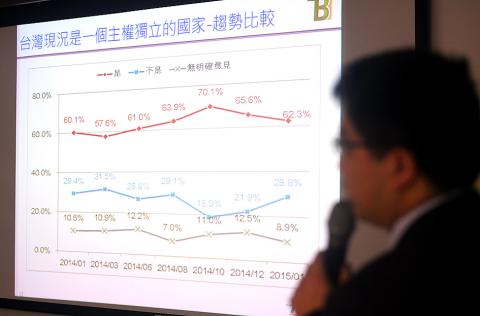A poll conducted by the Taiwan Braintrust shows that nearly 90 percent of the population would identify themselves as “Taiwanese” rather than “Chinese” if they were to choose between the two — and the percentage is even higher among those aged from 20 to 40.
With 1,079 valid samples from 20 cities and counties, the results show that if given the option of being “Taiwanese” or “Chinese,” 89.5 percent of respondents said they would identify themselves as Taiwanese, while just 6 percent said they consider themselves Chinese.
Notably, the percentage of people considering themselves Taiwanese rather than Chinese was larger for younger generations.

Photo: Liao Chen-huei, Taipei Times
Among those aged 70 or older, 76.2 percent said they consider themselves Taiwanese rather than Chinese, while 8.8 percent said they think of themselves as Chinese.
However, for people between 30 and 39 years of age, 93 percent identified themselves as Taiwanese, while 3.2 percent said they are Chinese, and for people from 20 to 29 years old, 92.5 percent identify themselves as Taiwanese, while just 2.4 percent said they are Chinese.
As for the nation’s future, 31.2 percent of respondents said they support independence for Taiwan, while 56.2 percent would prefer to maintain the “status quo” and 7.9 percent support unification with China.
However, when given “independence” and “unification” as the only options, 68.9 percent said they would support independence, while 17.1 percent would support unification with China.
Support for independence is also higher among younger generations, with 79.1 percent of people from 20 to 29 years of age supporting independence, while 12.7 percent support unification with China.
The poll also asked respondents about their impressions of domestic political parties and leaders.
Among the Democratic Progressive Party (DPP), the Chinese Nationalist Party (KMT), the Taiwan Solidarity Union and the People First Party, 33.9 percent of respondents said they prefer the DPP, while 20.5 percent said they support the KMT.
As for the parties’ leaders, 65 percent of respondents said they are satisfied with DPP Chairperson Tsai Ing-wen’s (蔡英文) performance, while 20.8 percent said they are not satisfied with her performance.
KMT Chairman and New Taipei City Mayor Eric Chu’s (朱立倫) support was a little behind, with 46.7 percent saying they are satisfied with his performance, while 27.1 percent are not.
At a press conference to release the results, former presidential adviser Koo Kwang-ming (辜寬敏) criticized Tsai, saying she is unable to solve most of the nation’s problems, including issues of cross-strait relations, while Tainan Mayor William Lai (賴清德) could work things out.
“Our objective is not to get someone elected president; we need a president who can lead Taiwan and solve all the problems,” he said.

ANOTHER EMERGES: The CWA yesterday said this year’s fourth storm of the typhoon season had formed in the South China Sea, but was not expected to affect Taiwan Tropical Storm Gaemi has intensified slightly as it heads toward Taiwan, where it is expected to affect the country in the coming days, the Central Weather Administration (CWA) said yesterday. As of 8am yesterday, the 120km-radius storm was 800km southeast of Oluanpi (鵝鑾鼻), Taiwan’s southernmost tip, moving at 9kph northwest, the agency said. A sea warning for Gaemi could be issued tonight at the earliest, it said, adding that the storm is projected to be closest to Taiwan on Wednesday or Thursday. Gaemi’s potential effect on Taiwan remains unclear, as that would depend on its direction, radius and intensity, forecasters said. Former Weather Forecast

As COVID-19 cases in Japan have been increasing for 10 consecutive weeks, people should get vaccinated before visiting the nation, the Centers for Disease Control (CDC) said. The centers reported 773 hospitalizations and 124 deaths related to COVID-19 in Taiwan last week. CDC Epidemic Intelligence Center Director Guo Hung-wei (郭宏偉) on Tuesday said the number of weekly COVID-19 cases reported in Japan has been increasing since mid-May and surpassed 55,000 cases from July 8 to July 14. The average number of COVID-19 patients at Japan’s healthcare facilities that week was also 1.39 times that of the week before and KP.3 is the dominant

The Chinese Communist Party’s (CCP) working group for Taiwan-related policies is likely to be upgraded to a committee-level body, a report commissioned by the Mainland Affairs Council (MAC) said. As Chinese President Xi Jinping (習近平) is increasingly likely to upgrade the CCP’s Central Leading Group for Taiwan Affairs, Taiwanese authorities should prepare by researching Xi and the CCP, the report said. At the third plenary session of the 20th Central Committee of the CCP, which ended on Thursday last week, the party set a target of 2029 for the completion of some tasks, meaning that Xi is likely preparing to

US-CHINA TRADE DISPUTE: Despite Beijing’s offer of preferential treatment, the lure of China has dimmed as Taiwanese and international investors move out Japan and the US have become the favored destinations for Taiwanese graduates as China’s attraction has waned over the years, the Ministry of Labor said. According to the ministry’s latest income and employment advisory published this month, 3,215 Taiwanese university graduates from the class of 2020 went to Japan, surpassing for the first time the 2,881 graduates who went to China. A total of 2,300 graduates from the class of 2021 went to the US, compared with the 2,262 who went to China, the document showed. The trend continued for the class of 2023, of whom 1,460 went to Japan, 1,334 went to